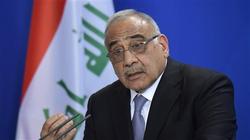 In the wake of a series of attacks on US military bases in Iraq that prompted Washington to blame Iran, Baghdad has warned against “an escalation.”
In the wake of a series of attacks on US military bases in Iraq that prompted Washington to blame Iran, Baghdad has warned against “an escalation.” RNA - On Friday, US Secretary of State Mike Pompeo claimed in a statement that Iran was providing "lethal aid and support to third parties in Iraq and throughout the region."
The White House, however, has offered no evidence to support its charge against Tehran.
According to a statement from the office of Iraq’s prime minister, US Secretary of Defense Mark Esper on Monday "expressed his concern" over the strikes in a telephone call with outgoing Prime Minister Adel Abdel-Mahdi.
In response, the Iraqi premier "called on everyone to spare no effort to prevent an escalation that will threaten all parties," the statement added.
"Unilateral decisions will trigger negative reactions that will make it more difficult to control the situation and will threaten Iraq's security, sovereignty and independence," Abdel-Mahdi said.
"If the Iraqi government or state weakens, this will exacerbate escalation and chaos," Abdel Mahdi told Esper.
Two Katyusha rockets targeted a compound near the Baghdad International Airport, which houses US troops, on Thursday. It was the 10th such assault since late October.
Another attack on December 9 on the same base wounded five members of Iraqi counterterrorism forces.
The United States has recently reinforced its security at the embassy in Baghdad, according to an Iraqi security source, who said "a convoy of 15 American vehicles each transporting armored trucks and weapons entered the Green Zone."
The attacks episode almost coincides with the publication of a report by The Wall Street Journal that said Saudi Arabia was quietly seeking to mend relations with Iran amid economic concerns and doubts about Washington's backing for Riyadh.
Washington’s newest threat against Iran can be viewed as a signal of support for Saudi Arabia to prevent a thaw in the kingdom's ties with the Islamic Republic.
The US, backed by Britain, invaded Iraq in 2003 under the pretext that the former regime of Saddam Hussein possessed weapons of mass destruction. No such weapons, however, were ever found in the country.
The invasion plunged Iraq into chaos and led to the rise of terrorist groups.
The US and a coalition of its allies further launched a campaign against purported targets of the Daesh Takfiri terrorists in Iraq in 2014, but their operations in many instances led to civilian deaths.
Now, the White House is weighing deployment of up to 7,000 additional troops to the Middle East in the face of what it calls a renewed Iranian threat. Although Esper on Friday again denied a report that a 14,000-strong deployment was under discussion.
847/940